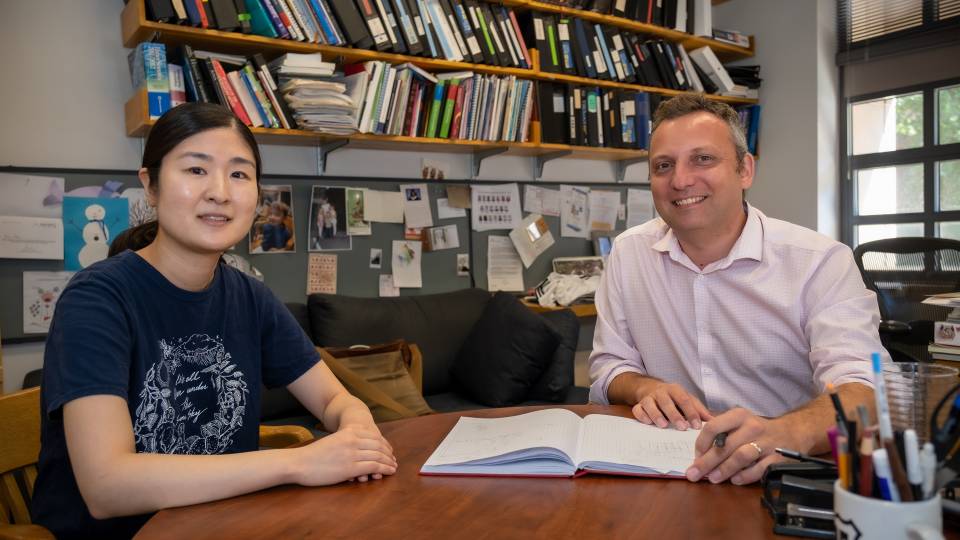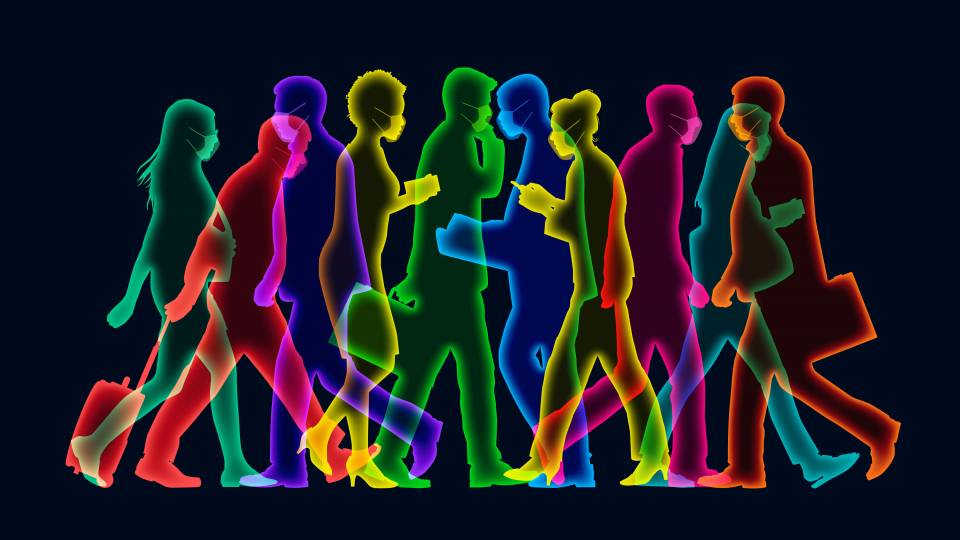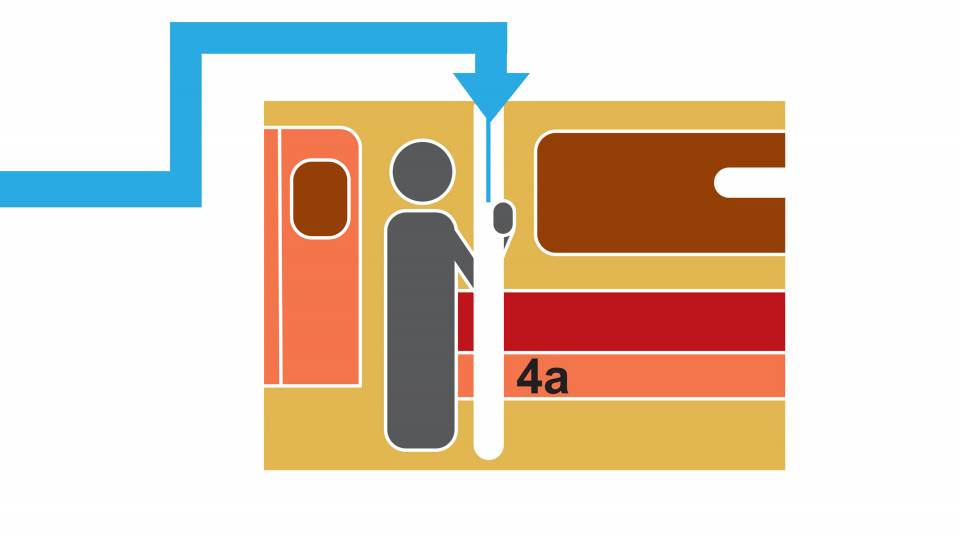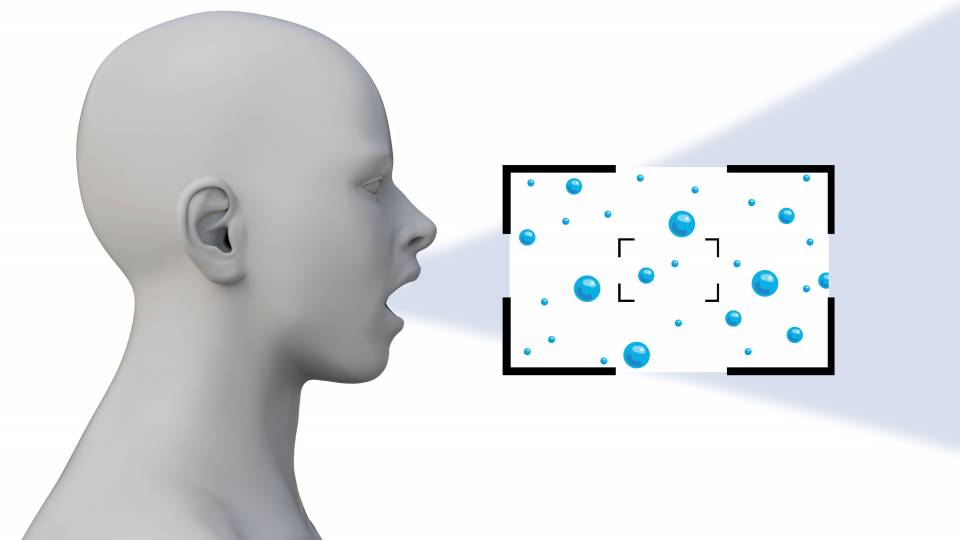If you’ve ever listened to “The Moth,” “Radio Diaries” or “This American Life,” you know the power of hearing real stories told by real people. If you’ve ever listened to a podcast, watched a YouTube video or read an online news article and immediately texted a link to your friend, you know how fast you can feel connected to others with the tap of a finger.
“The Manic Monologues” is a virtual theater experience designed to capture storytelling and shareability. Monologues of true stories, performed by professional actors, and pre-recorded conversations with Princeton students, experts and activists aim to disrupt the stigma around mental illness. Visit the interactive website. (“The Manic Monologues” website is an intensive media experience containing audio and animated graphics. It is best viewed on a desktop or laptop device, rather than a mobile or tablet device.)
The 21 monologues — including four submitted anonymously from the Princeton University community — reveal candid experiences of people of different backgrounds, places, ages, races and ethnicities. Some stories delve into psychosis, schizophrenia, bipolar disorder, depression and trauma response. Others illuminate living with mental illness during the pandemic, for example, how necessary safety precautions around germs can exacerbate OCD responses. All of the stories convey struggle and pain, triumph and resiliency.
Designed to look like an artist’s studio space, the website’s interactive features allow viewers to tailor their experience: choosing which stories they want to watch, writing their own story, doodling and manipulating the music. A virtual resource guide offers links to books, articles, research and the monologue scripts. The site’s “media center” hosts interviews with experts and advocates discussing the nexus of mental health with social justice, social media and COVID-19.
Inspired by a series of true vignettes first performed live at Stanford University in 2019, “The Manic Monologues” is a project of McCarter Theatre Center in collaboration with the Lewis Center for the Arts, and in association with Princeton University Health Services, TigerWell, The 24 Hour Plays® and Innovations in Socially Distant Performance. While “The Manic Monologues” was originally planned as a live reading at McCarter, the project took on a life of its own in the digital space.
Below, several of the project’s creators — Princeton faculty, alumni, staff and students — reflect on the silver linings of virtual theater in the pandemic and how they hope audiences will benefit. These musings are drawn from phone interviews and email.
Elena Araoz, virtual experience concept and director

Elena Araoz, lecturer in theater and the Lewis Center for the Arts
Araoz, a lecturer in theater and the Lewis Center for the Arts, leads the research initiative Innovations in Socially Distant Performance (ISDP), housed at the Lewis Center's Program in Theater. ISDP studies the aesthetics, philosophies, tools and artists transforming virtual live performance and socially distant productions, and how these practices will innovate the arts when we can gather again.
The first core value of theater is community. Typically, we go to the theater to sit next to strangers, people who might be very different than us, and experience a story together. The second core value is the live feedback loop that happens between audience and performer. Your laughter changes the performance. And the performance changes you. I wanted the online portal of “The Manic Monologues” to contain these core values of live theater.
All the people in these monologues could be living on your street, in your town, at your school. Even though you may not be viewing the experience while sitting next to someone, you are indeed a part of a community.
Fear of talking about mental illness does not allow people to get the help they need. I want the viewer to really take some mindful time in front of a screen to think about how they are within community in these stories, these conversations.
The community conversation becomes really wide with virtual theater. People can witness these stories who would never have been able to travel to Princeton. Others might come because of the interactivity, the creative coding or because they’re interested in multimedia arts. There is access to closed captioning in English and Spanish. It’s free, you don't even have to register, you just can go.
We all know that our theaters have been exclusive for a very long time. If audiences don't come, perhaps they haven't felt invited on their terms. We hope “The Manic Monologues” is a space that feels open and inviting, where people say, “Look at this cool thing, let me share the link with you,” and that it spreads.
We give a very clear content warning before every monologue that necessitates one, if it has content that might be a trigger for an audience member. This is very important when you’re talking about mental illness. There is a fine line: we want viewers to have these difficult discussions everywhere in their lives with more honesty and at the same time not send them away triggered or in fear.
Calvin Chin, director of Counseling and Psychological Services
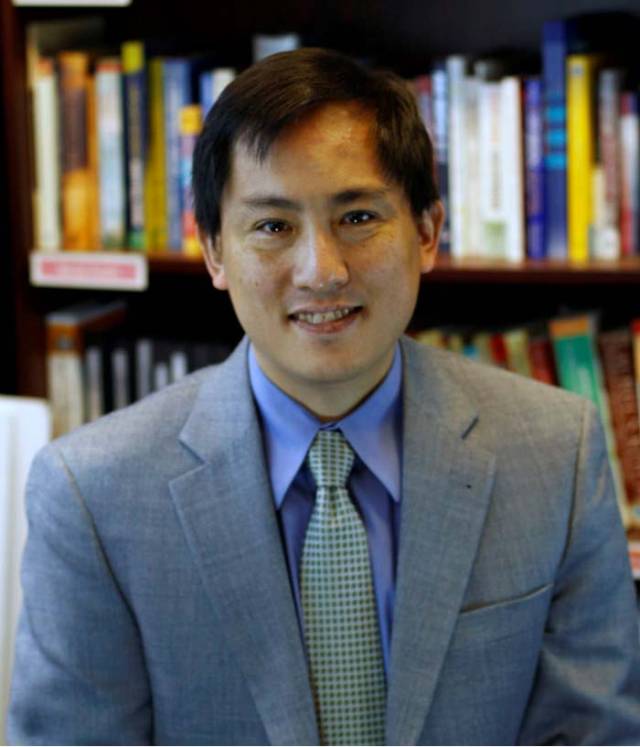
Calvin Chin, director of Counseling and Psychological Services, University Health Services
For “The Manic Monologues,” Chin interviews author Jean Twenge and facilitates the panel “Mental Health and COVID.”
It’s ok to struggle and not function at 100%. One helpful suggestion from the experts on the “Mental Health and COVID” panel is to allow yourself some grace and self-compassion around your personal reactions to the pandemic. Jean Twenge’s reflections on how the current pandemic may mark the demarcation of an entirely new generation of young people, much like the impact of the iPhone on the iGeneration, are fascinating.
“The Manic Monologues” is a powerful example of how art can promote healing. I hope that students who engage with the experience will have increased empathy for people who struggle with mental illness and feel less stigma around acknowledging vulnerability and personal struggles. By challenging negative stereotypes about mental illness, we can remove barriers to accessing care.
Milan Eldridge, stage manager
Eldridge, a 2020 alumna, is a theater designer, stage manager and filmmaker whose recent virtual theater work includes Princeton’s “All Her Power.”
I hope “Manic Monologues” allows people to know they are not alone. I hope they see the pervasive need to care for the mental health of oneself as well as those around them. I also hope the show fosters a sense of understanding among audience members who have not had extensive experiences regarding mental health.
Sarah Marie Bruno, health and life chair of the Graduate Student Government
Bruno, a graduate student in physics, participates in “A Student Conversation on Mental Health,” which explores the relationship between social media and mental health.
In my first year of graduate school here at Princeton, I failed the physics prelim exam, a written test that is a component of Generals. This experience seemed to confirm my growing suspicions that I was underqualified to study physics at Princeton. I distanced myself from my new friends and colleagues, fearing that the more time I spent with my peers, the more likely they would be to figure out I was a fraud. I ultimately sought mental health support at CPS and was connected with a therapist who helped me wade through the underlying causes of my anxious thoughts. After passing the prelim when I took it a second time, I was finally able to start opening up to my friends about what I had been feeling.
I became passionate about mental health advocacy, because I saw a real need for it — too often, folks suffer alone when loving support might just be down the hall.
The GSG organizes an annual campus-wide Mental Health Awareness Month every November. Events include guided mindfulness meditation sessions, training sessions on how to support a friend who is struggling, panel discussions on topics such as work-life balance in graduate school, self-paced online activities, and (pre-COVID) meet & greets with therapy puppies! Read more on our website.
Imposter syndrome is common in graduate school. There are studies that show it is even more common among women in STEM fields. As a graduate student in physics, I have found a wonderfully supportive community among fellow women physicists who have helped me feel a sense of belonging in the department.
One takeway from the student conversation is that school is only one part of who you are. Building meaningful relationships with others can be grounding and can help with reframing your values to support your wellbeing. What I love about “The Manic Monologues” is the emphasis on sharing stories. I think healing often comes from connection, and connections form when we share our stories with one another.

Milan Eldridge (left), a 2020 alumna; Sarah Marie Bruno, graduate student in physics; and Allen Liu, a member of the Class of 2022
Allen Liu, chair of the Undergraduate Student Government Mental Health Task Force
Liu, a member of the Class of 2022 and a concentrator in operations research and financial engineering, participates in “A Student Conversation on Mental Health.”
During my first year at Princeton, I had a personal mental health experience that stemmed from an academic failure. The USG president at the time, Rachel Yee, was also a vocal mental health advocate — her advocacy showed me how University resources (such as counseling) have a direct impact on student mental health.
During the pandemic, the task force has focused on making CPS's drop-in hours easily accessible over Zoom and available to students in different time zones. This semester, we are working to strengthen peer support systems, [through] peer-to-peer check-ins and identifying ways for student organizations to support members' mental health.
The biggest myth that needs busting — specifically this semester, for students living on or near campus — is that social life should resemble “normal.” The barriers to social interaction are much higher than in a normal semester and given the amount of (safe) social activity that is actually happening on campus, I think that many students feel excluded from the social scene or pressured to participate.
When it comes to failure specifically, there's almost certainly someone who's shared your experience. This is something that Diana Chao, Sarah Marie Bruno, and I all learned during our time at Princeton and brought up on the panel. Because we're hesitant to discuss failure at Princeton, it's difficult to find another person to help us navigate it. As students, we need to create spaces where we're comfortable discussing our own failures and support other students who have also faced setbacks.
Diana Chao, Class of 2021
Chao, a geosciences concentrator, founded Letters to Strangers (L2S) when she was 14, after bipolar disorder nearly ended her life. She shared her story in a 2018 a TedXTeen talk and on Princeton’s #TellUsTigers Instagram series. She participates in “A Student Conversation on Mental Health.”
Sharing my story on the TedXTeen stage where I had control over the way my narrative was told — that felt liberating and validating beyond anything I had hoped for. As much as we are told "you are not alone," we feel that statement so much more when we are catapulted into the stories of others ourselves, whether it be by telling our own story alongside others or listening to others tell us their tales.
I hope that student viewers will take this as a reminder that they matter, no matter what their mental health state might be like at any given moment. This is a celebration of empathy and resilience as much as it is of art and storytelling.

Diana Chao (left), Miranda Allegar and Katharine Matthias, all members of the Class of 2021
Miranda Allegar, student researcher, Innovations in Socially Distanced Performance
Allegar is a member of the Class of 2021 and a Princeton School of Public and International Affairs concentrator who is also pursuing a certificate in theater. For Manic Monologues, she created an annotated version of the script.
I read through each monologue with fresh eyes to note potentially opaque or un-clarified terms and descriptions. As we finished the initial recording process, the team decided to make this annotated version of the script accessible to viewers.
Expanding my definition of what theater-making can be has been the most surprising outcome of my ISDP research. [During the pandemic], we have seen unprecedented forms of theater-making. We have seen theater made through video games, mail, phone calls, Instagram direct messages. I’m excited by what this means for the form moving forward.
A sense of isolation has been one of the hardest aspects of the pandemic for me as someone who has struggled with my own mental health previously.
Katharine Matthias, student researcher, ISDP
Matthias, a member of the Class of 2021, is a comparative literature concentrator, and is involved as a director, playwright, performer and designer at the Lewis Center for the Arts. She serves on the creative team for “The Manic Monologues.”
At ISDP, we have been talking about virtual theater as a kind of puppeteering, and we challenged what "liveness" means for the theater through productions like “The Manic Monologues.”
Mental health has been especially challenging during the pandemic. “The Manic Monologues” combines monologues, mental health resources and interactive components to bring awareness and provide resources and support for anyone who may be struggling right now.

